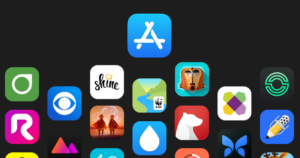The news that Apple is reportedly allowing rival app stores on iPhones and iPads in the European Union has sent shockwaves through the tech community. This move could have a huge impact on Apple’s business model and the way users interact with the App Store.

The tech giant Apple Inc. has made headlines once again with its latest move. According to Bloomberg’s report, the company is set to introduce a new policy in the European Union, in compliance with the new competition law—the Digital Market Act—that would allow users to bypass the App Store’s restrictions and commissions by allowing rival app stores on iPhones and iPads. This change could have a major impact not only on how users access apps and services but also on Apple’s position in the tech industry.
With this, Apple users will be able to bypass the App Store’s restrictions and the up to 30% commissions it charges on App Store purchases by downloading apps from third-party app stores. This means that iPhone and iPad users will be able to access apps that are not available in Apple’s App Store. This could drastically change the way users access apps, and it could potentially open up a new market for developers who have been constrained by the App Store’s rules.

This move is part of the European Commission’s efforts to foster fair competition in digital markets, and it could have a significant impact on Apple’s App Store. With the EU’s Digital Market Act, large tech companies will be obliged to comply with the new set of rules, or they could face a fine of up to 10% of their global revenue, which could potentially reach billions of dollars.
Apple currently has a monopoly over the App Store, and the company has been accused of using its monopoly power to stifle competition. The law could be seen as a way to level the playing field, allowing smaller developers and app stores to compete with Apple’s App Store.
However, there are still many questions about the proposal and how it will work in practice. For example, it is unclear what sort of restrictions would be imposed on rival app stores and how Apple would monitor the compliance of these stores. It is also uncertain how Apple will deal with the potential for fraud and abuse by third-party app stores.
Apple is still undecided as to whether they will comply with a portion of the new rules that allow developers to install third-party payment systems within their apps for purchasing subscriptions or in-app content. This change could potentially cut Apple out of the purchase process. But the changes to the app store restrictions are expected to go into effect with the release of iOS 17 next year. Although these changes will primarily affect Europe, they could potentially lay the groundwork for other regions as well.

No matter what happens, this move could have a major impact on the way users access and use apps on their iPhones and iPads. If this comes into effect, users could finally have more freedom and flexibility to access a wide range of apps that were previously unavailable in the App Store. This could open up new opportunities for developers, and it could potentially pave the way for fairer but more intense competition in the digital markets.
